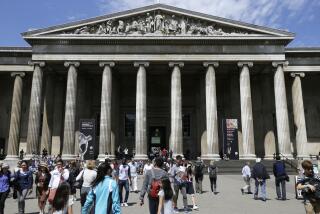Getty curator’s trial is delayed
- Share via
ROME — In a case with broad implications for the art world, the trial of a senior curator for the J. Paul Getty Museum in Los Angeles accused of illegally acquiring antiquities opened here Monday, and was almost immediately suspended to await translation of key documents into English.
The prosecution of Marion True, the Getty’s curator for antiquities and director of the Getty Villa, will resume Nov. 16, a three-judge panel decided.
True, 56, is accused of criminal conspiracy to receive stolen goods and illicit receipt of archeological items purportedly dug up in Italy. The case involves 42 allegedly looted objects and is more than 10 years in the making.
Through an attorney, True has asserted her innocence, and the museum has backed her up.
The small courtroom was unusually crowded Monday morning: two prosecutors, about a dozen defense attorneys and more journalists than the place typically sees in a week. Not present were True and her codefendant, art dealer Emanuele Robert Hecht. They were not expected because the day’s proceedings were dedicated to technical matters.
Among the battery of attorneys who will defend the veteran Getty curator is Franco Coppi, one of Italy’s most high-powered lawyers. He has represented numerous members of the Italian elite, including former Premier Giulio Andreotti in his trial for allegedly aiding the Mafia while in power.
Italian authorities hope the prosecution of True and others will set an example for the vast network of grave-robbers, smugglers, dealers and complicit curators who for decades have plundered the antiquity-rich countryside of Italy and other Mediterranean nations.
If a curator from an institution as prestigious and wealthy as the Getty is found guilty, prosecutors say, the case will serve as a deterrent.
Recovering objects that True and Hecht are accused of stealing, many of which are on display at the Getty, is not the primary goal of the case, lead prosecutor Paolo Ferri said.
“We are saying: Gentlemen, put an end to it,” Ferri said in an interview after Monday’s proceedings. “If you continue to use these fraudulent mechanisms ... we will get to the bottom of it, and we will expose you.”
Prosecutors contend that a multibillion-dollar black market in artifacts thrives in part because of a willingness by some art dealers to turn a blind eye to questionable provenance.
Ferri has not yet said how long a prison sentence he will seek. One of True’s codefendants, tried separately and convicted late last year, was sentenced to 10 years. Much of the evidence used to prosecute that dealer, Giacomo Medici, including thousands of photographs, documents and stolen artifacts confiscated in a series of raids in Switzerland in 1995, will be used in the case against True, judicial sources said. Medici is appealing his conviction.
As a separate portion of the case against True, the state is asking for civil penalties equivalent to $150,000.
Among the items named in the indictment is a keystone of the Getty collection, a 7 1/2 -foot likeness of Aphrodite carved in marble and limestone in the 5th century BC and imported by the Getty in 1987.
Hecht, a Paris-based dealer who is also a U.S. citizen, is accused of acting as a middleman between smugglers and several international museums. His Italian attorney, Alessandro Vannucci, said Hecht’s dealings have been aboveboard.
In Monday’s proceedings, Vannucci attempted to raise questions about portions of the indictment, including what he said were missing dates for the allegedly illegal excavation of some antiquities.
But the head judge, Gustavo Barbalinardo, said he was concerned that the formal notifications to True and Hecht that they must stand trial had not been translated into English. One of True’s attorneys, Francesco Isolabella, complained that the indictment also had not been translated.
Barbalinardo suspended the trial until Nov. 16 to allow time for the translations.
“The defendants must be served in their language,” he said. “We want to be sure we do not build this case on a shaky foundation.”
Maurizio Fiorilli, another prosecutor who represents the Culture Ministry in the case, said outside court that since True and Hecht read and speak perfect Italian, the insistence on translations was merely a delay tactic by the defense. Isolabella countered that it was the court, not the defense, that insisted on the translations.
More to Read
The biggest entertainment stories
Get our big stories about Hollywood, film, television, music, arts, culture and more right in your inbox as soon as they publish.
You may occasionally receive promotional content from the Los Angeles Times.











